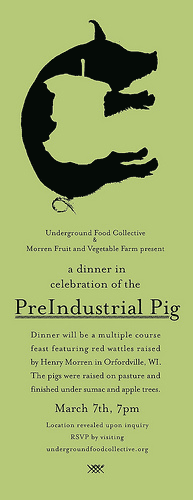
Braised Pork Bellies and the Foodie Underground
I was on the cutting edge of the slow food movement last night, and boy did it taste good. For 60 dollars a head, the Wisconsin-based Underground Food Collective, in cooperation with Morren Fruit and Vegetable Farm, served up eight courses of porcine-inspired fare in the multipurpose room of a community center in Madison. Billed as a “celebration of the PreIndustrial Pig” the dinner moved from a sublime pork liver paté and homemade pickles to celeriac with braised pork belly soup to a salad of roasted golden beets with citrus-cured two-year ham. But it wasn’t the citrus cured ham that made the meal cutting-edge, it was the means of delivery outside the conventional food system (i.e. restaurants and grocery stores). The Underground Food Collective and their PreIndustrial Pig dinners, which made quite a splash last month in New York, are on the vanguard of a burgeoning foodie underground, a loose constellation of secret supper clubs, extra-regulatory dairy farmers, and FDA-skirting meat CSAs that occupy that liminal space between a food conspiracy and your local hipster record store.

Take, for example, Gourmet’s four-part investigation of underground supper clubs, or the almost laughably New York-centric piece in last week’s New York Times, which heralded the birth of a “new culinary movement” in Brooklyn. (Never mind that people have been pickling and curing meat in the rest of the country for centuries. Now they’re doing it in Brooklyn!) Quoted in the article is Gabrielle Langholtz, the editor of Edible Brooklyn, describing the underground foodie demographic perfectly: “It’s that guy in the band with the big plastic glasses who’s already asking for grass-fed steak and knows about nibs.” As with audiophiles, bibliophiles, and art snobs, many underground foodies fetishize scarcity and obscurity to the point of absurdity, focusing on the rarity of the varietals and the inaccessibility of the producer, instead of how the food tastes and where it comes from. There is also a participatory element to the foodie underground. Just as every audiophile wants to be in a band and every bibliophile is trying to finish his novel, these foodies are pickling their own okra and brewing their own beer, sprouting lentils, and making strawberry rhubarb preserves.
Now, I have nothing against canning or pickling or brewing beer. I recently made a batch of sprouted garbanzo bean hummus and I’ve been trying to finish my novel for the past two years. Local and sustainably-produced food not only tastes good, it also supports local economies and preserves historic foodways. I have endless respect for the good people of the Underground Food Collective and was truly bowled away by their meal. But in certain other quarters, the food itself is irrelevant. When food becomes a mask for snobbery and pretension, when we start drawing lines between our enlightened food choices and the unwashed chipotle-Doritos eating rabble, the foodie underground ceases to be a movement and starts to become nothing more than a demographic.
